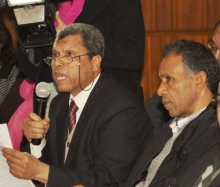Tunisian unions block privatisation of renewable energy

Faced with increasing energy costs, the inevitable decline in fossil fuels and an energy deficit in their country, trade unions in Tunisia are looking closely at the energy situation and how to deal with it.
The Tunisian federation for electricity and gas unions (UGTT) is a PSI affiliate. Given that the world energy situation is not sustainable, and in agreement with PSI Congress resolutions, the federation is looking into alternative energy resources and particularly renewable energy.
At the end of 2013, the Tunisian Ministry for Industry and Energy presented draft legislation calling for the production of renewable energy by private sector companies.
The Ministry transferred the draft legislation to the National Constituent Assembly (NCA) for rapid adoption. When the unions became aware of the situation, they requested the NCA president to block the legislation because the social partners had not been consulted. The NCA did so, and the Energy Commission invited the unions to present their case.
The Minister invited the unions to a meeting on 4th January, where they met with officials from the Ministry and the NCA. The unions were able to use information they had obtained via PSI and the PSIRU (for example, on International Financial Institutions (IFS) and their problematic policies on energy sector privatisation, including renewable energy). They distributed documents giving examples of privatisation experiences in other countries and continents and how to avoid making the same mistakes.
With the support of several officials from the NCA, the unions successfully presented their arguments to show that Tunisia does not need these huge energy projects. Following their presentation, the private sector Tunur project was shelved, with the public company STEG remaining the central partner for all future energy development and in favour of renewable energy developed and financed by the public sector.
The unions also insisted that IFIs must stop massacring the public sector with arguments that cannot be sustained. They highlighted the necessity to work with energy sectors in other countries in the Arab region in order to put more pressure on the authorities and present a common front so that renewable energy sources can be exploited for the good of the public sector and the good of humanity.
Report by Mansour Cherni, PSI Coordinator for utility workers in the MENA region

